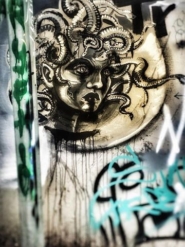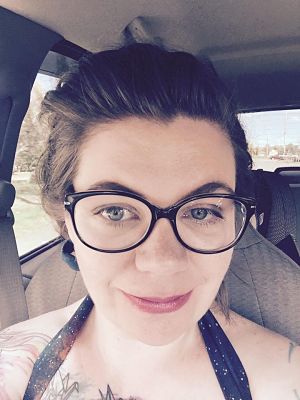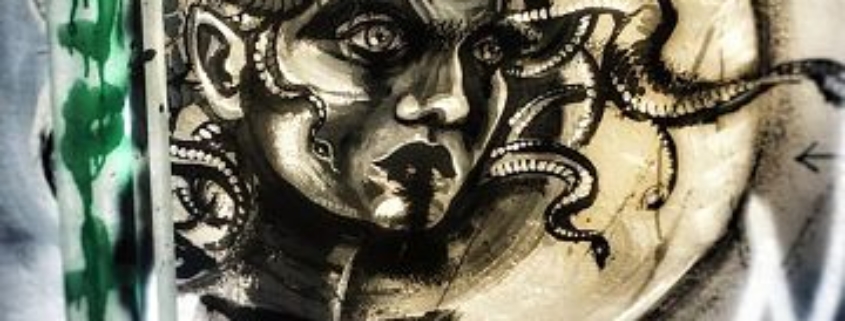Between the Lines: Unsolved Mysteries After Death
 Growing up, I consumed mysteries—gorged even. I binge-watched reruns of Unsolved Mysteries before binging was cool. I watched episodes alone in the dark and pretended to hold seances with Robert Stack. I had a thing for him. It wasn’t a crush. Maybe just a love of the macabre. Something about the theme music and the cadence of Stack’s disembodied voice, somewhere between intense yet unaffected. The kind of voice you feel in your bones.
Growing up, I consumed mysteries—gorged even. I binge-watched reruns of Unsolved Mysteries before binging was cool. I watched episodes alone in the dark and pretended to hold seances with Robert Stack. I had a thing for him. It wasn’t a crush. Maybe just a love of the macabre. Something about the theme music and the cadence of Stack’s disembodied voice, somewhere between intense yet unaffected. The kind of voice you feel in your bones.
I still carry voices around with me. Robert Stack’s is one of them. Sometimes when I try to solve cold cases in my own life, Stack will narrate for me: “In tonight’s episode, Kori’s tuna sandwich vanishes without a trace. Join us, and maybe you can help solve a mystery.” Other times, he narrates my tragedies: “In tonight’s episode, with the loss of a loved one, a girl’s life changed overnight. What happened? You decide, tonight on Unsolved Mysteries.”
My Aunt Jan’s voice follows me, too. That voice that tells you, you’re no good—that’s my aunt’s voice for me. As a Baptist woman, she made it her mission to save her sister’s children.
She gifted my sister and I with Chick Tracts, a Christian comic aimed at kids interested in following in the steps of Jesus. These charming stories explore what happens when the devil possesses your body. Spoiler: you go to Hell. Every time.
My love for the macabre didn’t fall under my aunt’s approved lifestyle choices or her how-to list for making it into heaven. As a seven-year-old, I viewed Hell as a physical space occupied by people. I counted myself among the damned because when I weighed the consequences of indulging in mysteries versus a lifetime in Hell, Robert Stack won. Every time.
I kept holding my seances with Robert Stack, only now they became something more. They let me distance myself from my aunt and Chick Tracts. They gave me a means to escape. My favorite Unsolved Mysteries episodes focused on disappearances, the episodes where people vanished without leaving clues behind except the spaces they used to occupy, and the memories other people carried with them. Stack theorized about abductions, aliens, even Big Foot. These sounded reasonable to me—more logical than those Christian comics anyway.
Unsolved Mysteries left me with some scars; you don’t get over that voice. Even now, I feel chills when I hear the theme song. But I was hooked. After a night of binging, I didn’t sleep. I laid in my bed and thought about the space I occupied and about my goals. Between Unsolved Mysteries and Chick Tracts, I already had a warped idea of death, so I thought about that, too. What would I leave behind when I died? What stories would be lost? What would people say about me?
* * *
I’m still in love with the macabre. That’s probably how I found myself writing obituaries for a crematory. Funeral homes house mysteries, too—people die and they disappear. Their stories are lost, and all that is left are the spaces they used to occupy. 
Families try to translate the gaps that the dead leave and turn them into obituaries. It’s an art to summarize a person’s life in a few paragraphs. And here’s the thing, sometimes obituaries and fiction are interchangeable. I try to piece together clues—the fragments of someone’s life which live in between the lines. The most interesting parts of humanity are too flawed to make it into the obituary section of the Sunday newspaper. Death reduces a person to a single, static role: Eva was a great mother and grandmother; Connor was a provider; Joe was an average golfer.
The mystery of the obituary lies in the last space that the deceased occupies in someone else’s mind and memories. The family brings me a pamphlet no bigger than one of those Chick Tracts my aunt used to give me, but instead of the devil, there is a picture of a saint. The family translates a life, and I translate the translation. Gaps are inevitable. When a person dies, their stories fade, too.
The day after Labor Day my Uncle Joel disappeared—he died from a heart attack. I’m around death daily, but always at arm’s length, so when death swallowed my uncle like a sink hole, I disconnected, as I always do. I found Robert Stack and old reruns of Unsolved Mysteries, and I didn’t sleep.
Lying in bed, I thought about my uncle: the disappearing man. My funeral director told me my uncle was an organ donor. The bones of his arms and legs are gone, his skin and eyes gone—the parts of him I remember belong to someone else now. Like one of those re-enactment scenes in true crime shows where the actors only somewhat resemble the victim, after death, my uncle only resembles himself.
That’s true for his obituary, too. It will resemble his life as much as our family can translate it. The obituary will talk about what he loved: bowling, the Dodgers, his grandkids. I’ll look at the finished product, a couple of paragraphs and his picture. It won’t talk about his struggles: his life with his ex-wife; a daughter he never saw; the way his dad abandoned him and his siblings.
I don’t know Uncle Joel’s stories. I only know the whispers at holidays and family get-togethers as the adults talked amongst themselves. I’ve taken those fragments and invented a person who I believed was my uncle, but probably wasn’t. Anyway, those parts of his life will disappear with him, gone like his organs and bones.
* * *
In some ways, funerals are like the séances I held when I was younger, although I’ve never heard an officiant speak in a Robert Stack voice.
 My big Italian family will gather for a Catholic Mass, and we’ll chant prayers and light candles to communicate with the dead—to say a last goodbye to my uncle. My Aunt Jan will be there, too, grieving for her brother. I haven’t seen or talked to her in over a decade.
My big Italian family will gather for a Catholic Mass, and we’ll chant prayers and light candles to communicate with the dead—to say a last goodbye to my uncle. My Aunt Jan will be there, too, grieving for her brother. I haven’t seen or talked to her in over a decade.
My Italian family came together when my brother’s six-month-old died. I remember my nephew lying in a little oak box set at the front of the church.
I felt myself disconnect, maybe the first time I was aware I was detaching. I wasn’t an aunt looking at my nephew. I was an actress in a reenactment. The whole scene reminded me of one of those comics Jan used to give me. There was one about a poor beggar girl whose soul rises to Heaven leaving behind her body. One of the only ones I remember where the character didn’t go to Hell.
In each panel, it rained, and the girl shivered. I brushed my hand against my nephew’s forehead: he was cold. It was the kind of image you feel in your bones. It scared me just as much as the images of Hell because I realized that some stories disappear. Others are never told.
 Kori Kessler is obsessed with pop culture. She has a love for misunderstood female characters and murder mysteries. Currently, she attends Antioch University Los Angeles and lives with her family and their three dogs Ginsberg, Elliot, and Stella.
Kori Kessler is obsessed with pop culture. She has a love for misunderstood female characters and murder mysteries. Currently, she attends Antioch University Los Angeles and lives with her family and their three dogs Ginsberg, Elliot, and Stella.





